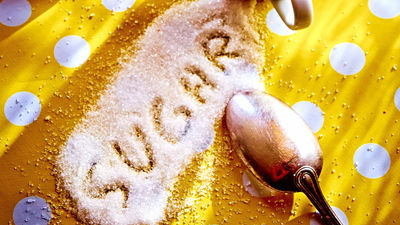Foods and beverages are getting sweeter and sweeter, especially artificial sweeteners taken from beverages increased by 36% in just a few decades

Many people like to eat and drink sweets and drinks, but in recent years there have been concerns about health problems due to excessive intake of sugar. Therefore, a research team
Global trends in added sugars and non-nutritive sweetener use in the packaged food supply: drivers and implications for public health | Public Health Nutrition | Cambridge Core
https://doi.org/10.1017/S1368980022001598
Food and drinks are getting sweeter. Even if it's not all sugar, it's bad for our health
https://theconversation.com/food-and-drinks-are-getting-sweeter-even-if-its-not-all-sugar-its-bad-for-our-health-187605
For old humans who lived in times when food supply was unstable, sweetness functioned as a signal that ``contains a lot of calories and is not poisonous'', and for reasons such as nutritional supplementation and non-toxicity. It is said that humans have come to like sweets . However, in modern times, sweet foods and drinks are very easy and cheap to obtain, and the adverse health effects of excessive sugar intake are regarded as a problem. The recommended daily intake of sugar is less than 9 teaspoons for men and less than 6 teaspoons for women, but many people exceed these recommendations.
Therefore, in recent years, the government has intervened with policies such as a “ sugar tax ” that imposes a tax on sugar and “ banning the advertisement of unhealthy sweets ”, and the food industry has introduced sugar as a low-calorie or non-nutritive sweetener (NNS). /Non-nutritional sweeteners) are gaining momentum. Regarding these movements, a research team led by Sherry Russell, a Ph.D. The we.

The research team used 2007-2019 market sales data from Euromonitor International, an international market research company, to examine the amount of added sugar and artificial sweeteners in packaged foods and beverages.
Analysis showed that per capita intake of artificial sweeteners from beverages increased by 36% from 2007 to 2019, and sugar intake from packaged foods increased by 9%. While the amount of sugar in beverages has fallen by 22% in high-income countries, it has increased by 13-40% in middle-income countries, prompting the food industry to 'market healthier beverages in high-income countries, We also know that income countries use different strategies to sell more sugary drinks.
It was also found that artificial sweeteners contained in beverages significantly increased in areas where the government implemented policy interventions such as educational campaigns, sugar taxes, and advertising restrictions to prevent excessive intake of sugar. While artificial sweeteners certainly have very few calories, studies have linked artificial sweetener consumption to type 2 diabetes and heart disease, and
In addition, it is possible that the consumption of foods and drinks that are sweetened by artificial sweeteners may affect the sense of taste and may lead to a preference for sweeter foods. This effect appears to be particularly large in children who are still developing their taste preferences. In addition, the research team pointed out that certain artificial sweeteners are environmental pollutants, and that ultra-processed foods containing artificial sweeteners consume large amounts of resources such as energy, water, and packaging materials.

The research team said, ``When making policies to improve public health nutrition, it is important to consider unintended consequences. There is merit in advocating policies that consider a broad range of food aspects, including impacts, and such policies should promote nutritious and less processed foods.'
Related Posts:







